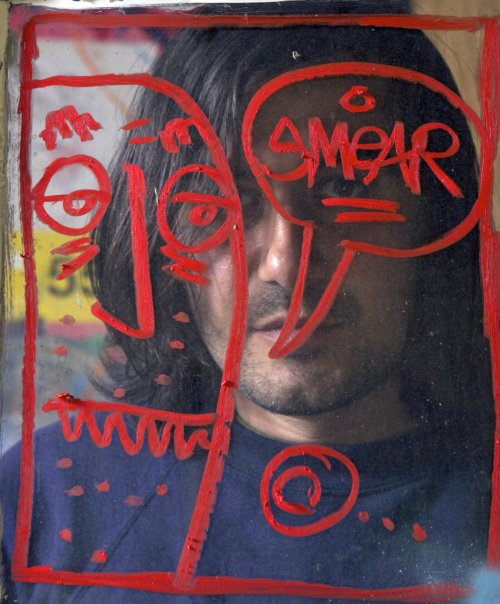LOS ANGELES (AP) ― Not so long ago, Cristian Gheorghiu roamed the streets of Los Angeles at all hours, black marker in his pocket, hunting for walls and street signs where he could scrawl his graffiti moniker, “Smear.’’
These days, the Romanian-born Gheorghiu is working in his garage, splashed in paint and surrounded by canvases, paint cans, markers and odds and ends he uses to fashion abstract mixed-media artworks, which have been exhibited in galleries from California to Europe, fetching up to a couple of thousand dollars.
“Painting is a good way to wean yourself off graffiti, get that bug out,’’ said Gheorghiu, a slightly built 34-year-old with shoulder-length hair. “It’s kind of evolved. I’ve had some moderate success.”
Although he says his tagging days are past, Gheorghiu’s past is now tagging him.
The Los Angeles city attorney’s office has filed a lawsuit against Gheorghiu and nine other graffiti writers associated with the MTA tagging crew, charging them with violating California’s unfair competition laws because they’re selling art works on the strength of their outlaw names and reputations.
“They’ve obtained an unfair advantage because they gained fame and notoriety through criminal acts,’’ said Anne Tremblay, assistant city attorney. “This is unlawful competition.’’
These days, the Romanian-born Gheorghiu is working in his garage, splashed in paint and surrounded by canvases, paint cans, markers and odds and ends he uses to fashion abstract mixed-media artworks, which have been exhibited in galleries from California to Europe, fetching up to a couple of thousand dollars.
“Painting is a good way to wean yourself off graffiti, get that bug out,’’ said Gheorghiu, a slightly built 34-year-old with shoulder-length hair. “It’s kind of evolved. I’ve had some moderate success.”
Although he says his tagging days are past, Gheorghiu’s past is now tagging him.
The Los Angeles city attorney’s office has filed a lawsuit against Gheorghiu and nine other graffiti writers associated with the MTA tagging crew, charging them with violating California’s unfair competition laws because they’re selling art works on the strength of their outlaw names and reputations.
“They’ve obtained an unfair advantage because they gained fame and notoriety through criminal acts,’’ said Anne Tremblay, assistant city attorney. “This is unlawful competition.’’

The argument is a novel one in the legal annals of efforts to prevent criminals from profiting from their crimes, and represents a new weapon in the city’s long-suffering battle against graffiti vandals. It also comes at a time when the market for so-called street art is growing exponentially.
But Peter Bibring, Gheorghiu’s lawyer, says the city attorney’s lawsuit is a thinly-veiled end run around the right to free expression guaranteed by the First Amendment of the U.S. Constitution.
“This is an extraordinary overreach,’’ said Bibring, staff attorney of the American Civil Liberties Union of Southern California. “The government cannot say who can be an artist.’’
For years, states have tried to block felons from making money mainly through book and movie deals. The U.S. Supreme Court and other courts have repeatedly struck down so-called “Son of Sam’’ laws, named after New York’s efforts to block 1970s serial killer David Berkowitz from selling his story.
Courts have upheld that criminals have a right to free expression, which includes everything from writing about their crimes to painting about them ― and profiting. The fact that crime can pay, however, rankles victims.
“It’s a perversion of the criminal justice system that one can take damage to an innocent victim and profit from it. Their story becomes a commodity,’’ said David J. Cook, the San Francisco lawyer who has doggedly pursued a $33.5 million wrongful death judgment against O.J. Simpson for the family of victim Ronald Goldman.
Simpson was acquitted of murdering his ex-wife, Nicole, and her friend, Goldman, but hit with damages in civil court.
Victims have been able to thwart criminal profiteering by filing civil lawsuits to collect proceeds from any book or movie deal and by plea bargains that stipulate any profits from such deals must be turned over to the victim.
Using an unfair competition law and targeting graffiti writers’commercial works are both in uncharted legal territory. The maneuver underscores authorities’ exasperation with a subculture that prizes prolific defacement of public property, including buses, street signs and freeway overpasses, and costs taxpayers millions of dollars to remove.
Just one of the MTA’s tags ― its initials painted 17.4 meters high and a 400 meters long on the Los Angeles River concrete embankment ― cost the city $3.7 million to paint over.
Tremblay said her lawsuit is not aimed at preventing Gheorghiu from making a living as an artist or from using the name “Smear.’’
However, it requests that a court declare him and nine other graffiti writers in violation of the unfair competition law because they’ve sold art signed with their tag names, and that they be barred from selling photos of graffiti that includes the writers’tags or the name MTA.
“They’re creating a crime scene and taking photos of it to sell,’’ said Tremblay, who is also seeking to have the MTA be subject to legal restrictions as a criminal street gang and pay $5 million in fines and damages.
But use of crime scene photos, commonly featured in crime books, and nicknames, such as mobsters’ colorful monikers, can’t be limited, said David L. Hudson, scholar at the First Amendment Center.








![[KH Explains] Hyundai's full hybrid edge to pay off amid slow transition to pure EVs](http://res.heraldm.com/phpwas/restmb_idxmake.php?idx=644&simg=/content/image/2024/04/18/20240418050645_0.jpg&u=20240419100350)






![[From the Scene] Monks, Buddhists hail return of remains of Buddhas](http://res.heraldm.com/phpwas/restmb_idxmake.php?idx=652&simg=/content/image/2024/04/19/20240419050617_0.jpg&u=20240419175937)

![[KH Explains] Hyundai's full hybrid edge to pay off amid slow transition to pure EVs](http://res.heraldm.com/phpwas/restmb_idxmake.php?idx=652&simg=/content/image/2024/04/18/20240418050645_0.jpg&u=20240419100350)

![[Today’s K-pop] Illit drops debut single remix](http://res.heraldm.com/phpwas/restmb_idxmake.php?idx=642&simg=/content/image/2024/04/19/20240419050612_0.jpg&u=)